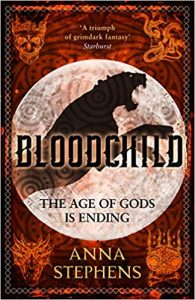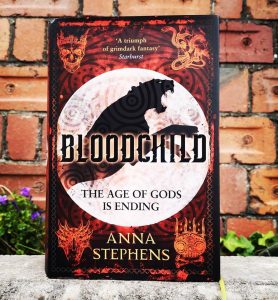BLOODCHILD by Anna Stephens (Book Review)
 Where do you begin, reviewing the last book of a trilogy?
Where do you begin, reviewing the last book of a trilogy?
Well, with the trilogy itself I guess!
There are trilogies out there which don’t quite convey that idea of an over-arcing story. They are connected by characters, or place, but have that slight disconnect from each other. Like book one was written as a standalone and then books two and three were afterthoughts. Conversely there are trilogies, or even series, out there that have the one over-arcing story spread over the three books, but the individual books don’t have their individual arcs. Book one is the intro, book two is the stepping stone, book three the finale.
The Godblind trilogy is one of those very few trilogies that transcends this.
There is an over-arcing story, a war to be won, that connects the three books together. However, each book is a distinct individual, each book represents a battle on the way to winning that war. Not so much so that you could read it as a standalone, but enough so that it is recognisable from its sisters, that it has its own personality and story to tell, whilst still being integral to the trilogy as a whole. And I don’t mean that each book represents a battle literally by the way, that’s not the plot of each book…

The Godblind trilogy is quite possibly the first instance of a story wherein I’m struggling to pin down whether it is plot driven or character driven. There is a strong plot that drives each individual book, and the trilogy as a whole. But our characters aren’t exactly dragged along by circumstances and events, as they typically are in these plot-dominant stories. They are very much the instruments of their own will. The Plot is a beast roaring through each book, but the characters are standing proud and roaring right back in its face with the strength of any Dickensian character-driven saga. It makes for a heady mix of exciting, adventure-fueled plot that whips you along; with unforgettable and heart-breaking characters who feel like, at any moment, they are going to step off the page before you.
I’m going to narrow our focus now to Bloodchild itself, and it’s going to be impossible to avoid spoilers. Sorry, not impossible, boring.
“Omg and the bit when you know who breaks across the you know what and then they, you know“.
Nope. So please, if you haven’t read this trilogy yet, or if you’re half way through it, go away. In the nicest way.

This trilogy is the kind that takes a heavy toll on the reader; you find yourself so deeply invested, enthralled, that I came to Bloodchild with no small sense of trepidation. But my gods does she deliver. There’s no denying she had a lot to live up to, she had a lot of expectations to fulfil, and she did it all in ways I couldn’t possibly have been ready for. It felt like Stephens turned everything up just a notch; when you thought this world couldn’t possibly give you more.
Back in my review for Godblind I said that, through the flickering pov, you don’t quite get to know the characters well enough, and it’s harder to trust them. By Bloodchild, I felt myself knowing the characters but not necessarily trusting Stephens. Stephens is not the kind of author to attempt to create shock-value in her stories. Events unfold and decisions are made and it reads as naturally as if there were a higher prescience than merely an author behind it all. I didn’t stop to question why any given character chose the routes they did; not that some of their decisions were not upsetting, or resulted in something upsetting, but rather it didn’t feel like I was reading something fictional with the option for something else to have happened. And I don’t know how she did that.
Something I explored in my review of Darksoul was the objectivity of the narrative voice, and this is still very much the backbone of this trilogy. There are no foregone conclusions here. Having known this with Godblind and Darksoul, I still stupidly expected it in Bloodchild. And when you don’t get your way as a reader, it creates a big impact. In line with this idea, it really struck me reading this final book just how well our villains had been written. These are not ‘bad guys’ who are merely ‘being bad’. Their motivations are perfectly human and understandable; their actions may be reprehensible, but they are not empty actions. They truly believe in what they are doing, and that belief in itself is believable. These characters have all the depth and realism that our protagonists do. They also at times, frustratingly, even garner sympathy (fast becoming Stephens’ recognisable modus operandi.)
It’s safe to say this trilogy had a huge impact on me, that I fell in love with the characters utterly. Ultimately, it is they that will keep calling me back to this story.

